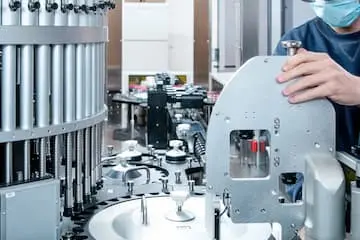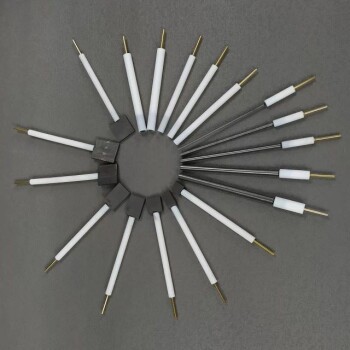Rotating Disc Electrode (RDE) is a hydrodynamic working electrode used in electrochemical applications such as corrosion studies, fuel cell research, catalyst development, and controlling mass transport of reactants to the electrode surface. The electrode rotates during experiments, making a constant flux of analyte to the electrode. As the disk turns, some of the solution described as the hydrodynamic boundary layer is dragged by the spinning disk and the resulting centrifugal force flings the solution away from the center of the electrode. This flow can quickly achieve conditions in which the steady-state current is controlled by the solution flow rather than diffusion.
Toggle Categories
Get Instant Support
Choose your preferred way to connect with our team
-
Get Free Quote Fill out form for detailed pricing
-
Send Email Detailed inquiry support
-
WhatsApp Quick mobile chat
Response Time
Within 8 hours on working days, 24 hours on holidays
rotating disc electrode
We offer the best rotating disc electrode solutions for electrochemical applications such as corrosion studies, fuel cell research, and catalyst development. Our extensive portfolio guarantees there is an appropriate standard solution that will meet your needs. For more unique applications, our bespoke design service allows us to meet almost any customer requirement.
Applications of Rotating Disc Electrode
- Corrosion studies
- Fuel cell research
- Catalyst development
- Controlling mass transport of reactants to the electrode surface
- Investigating reaction mechanisms related to redox chemistry
- Multi-electron transfer
- Kinetics of a slow electron transfer
- Adsorption/desorption steps
- Electrochemical reaction mechanisms
- Simulating the corrosion environment inside a pipeline in the oil industry
- Collecting species produced on the disk in rotating ring-disk electrode (RRDE)
- Studying homogeneous bulk reactions of intermediate species produced at the disk in RRDE instruments
- Fuel cells
- Hydrogen production
- Depollution
- Electrochemical sensing
Advantages of Rotating Disc Electrode
- Provides a constant flux of analyte to the electrode surface, allowing for precise control and determination of the reactant transportation near the electrode surface.
- Allows for the investigation of different electrochemical phenomena, including multi-electron transfer, the kinetics of a slow electron transfer, adsorption/desorption steps, and electrochemical reaction mechanisms.
- Can achieve conditions where the steady-state current is controlled by the solution flow rather than diffusion, providing better accuracy in experimental data.
- Allows for the study of homogeneous bulk reactions of intermediate species produced at the disk by comparing experimental data to theoretical terms.
- Can be used in various electrochemical applications such as corrosion studies, fuel cell research, catalyst development, and controlling mass transport of reactants to the electrode surface.
- Rotating cylinder experiments are important in the oil industry to simulate the corrosion environment inside a pipeline, avoiding the need for expensive flow loop setups.
- Provides an ideal tool for flow conditions at the rotating cylinder, which are generally turbulent even at low rotation rates.
- Can be made from a variety of different metals to evaluate their performance, including carbon steel and stainless steel.
- The base rotation rate can be manually adjusted, providing flexibility in experimental design.
Our Rotating Disc Electrode is a cost-effective solution that provides high-quality results for various electrochemical applications, such as corrosion studies, fuel cell research, catalyst development, and more. Our extensive product line provides standard solutions that cater to your needs, and our custom design service ensures that we meet your specific requirements.
FAQ
What Is Rotating Disk Electrode Used For?
What Is The Rotating Electrode Method?
What Is The Rotating Ring-disk Electrode Method?
What Are The Advantages Of Rotating Disc Electrode?
REQUEST A QUOTE
Our professional team will reply to you within one business day. Please feel free to contact us!
Related Articles

Escaping the Black Box: The Architecture of Insight in Electrochemistry
Unlock the correlation between visible phenomena and electrical data. A deep dive into the engineering and application of side-window optical electrolytic cells.

The Invisible Variable: Why Electrolytic Cell Hygiene Defines Data Integrity
Master the art of electrolytic cell maintenance. Discover how a strict cleaning protocol prevents cross-contamination and secures reproducible electrochemical results.

The Silent Interface: Mastery Over Electrode Decay
Electrode failure is rarely sudden; it is the compound interest of neglect. Learn the disciplined maintenance protocols that preserve accuracy and longevity.

Why Your High-Temperature Furnace Elements Fail: The Critical Difference in Silicon Carbide
Furnace downtime from failing SiC heating elements costs time and money. Discover the critical material difference that ensures reliability in extreme applications.

Understanding Optical Filters
An overview of optical filters, their types, and applications.

Understanding and Selecting the Right Microplates for Laboratory Applications
Guide to choosing microplates based on pore density, materials, colors, well shapes, and surface finishes for various laboratory applications.

Guide to Reference Electrodes in Electrochemical Measurements
Detailed guide on reference electrodes, their use, maintenance, checking methods, regeneration, storage, and applications.

Glymercury Electrode: Composition, Characteristics, and Applications
An in-depth look at the glymercury electrode, its composition, characteristics, and applications in analytical chemistry.

Use and Care of Reference Electrodes
Detailed guide on the use, calibration, and maintenance of reference electrodes in electrochemical studies.

Design and Application of Reference Electrodes in Lithium Batteries
An in-depth analysis of the design, features, and applications of reference electrodes in lithium batteries.

Understanding Electrodes in Electrochemical Systems: Working, Counter, and Reference Electrodes
An overview of the roles and characteristics of working, counter, and reference electrodes in electrochemical systems.

Design Principle and Application of Reference Electrodes for Lithium Batteries
Discusses the design principles, types, applications, and future directions of reference electrodes in lithium batteries.

Introduction to Rotating Disc Electrodes and Common Electrochemical Applications
An overview of rotating disc electrodes and their applications in various electrochemical studies, including catalyst evaluation, battery research, and corrosion protection.

Electrochemistry Basics: Conditions and Precautions for Using Different Reference Electrodes
A guide on the requirements and conditions for using various reference electrodes in electrochemistry.

Identifying and Addressing Issues with a Bad Reference Electrode in Measurement Systems
This article discusses the signs and solutions for a bad reference electrode in measurement systems, focusing on IR voltage drop, high-frequency artifacts, and methods to identify and save a bad reference electrode.

Design and Application of Reference Electrodes in Lithium Batteries
This article discusses the selection and design of reference electrodes for lithium batteries, focusing on active materials like lithium metal, lithium alloys, and lithium-embedded oxides.

Exploring Rotating Electrode Technology in Electrochemistry
An in-depth analysis of rotating electrode technology, its applications, and its impact on electrochemical reactions under different flow conditions.

Understanding the Rotating Disk Electrode: Principles and Applications
Explores the development, principles, and applications of the rotating disk electrode in electrochemistry.

Electrochemical Advancements and Applications
A comprehensive overview of the historical development, theoretical advancements, and practical applications of electrochemistry.

Steady State Measurements in Electrochemistry
An in-depth look at steady state measurements in electrochemistry, including techniques and applications.



